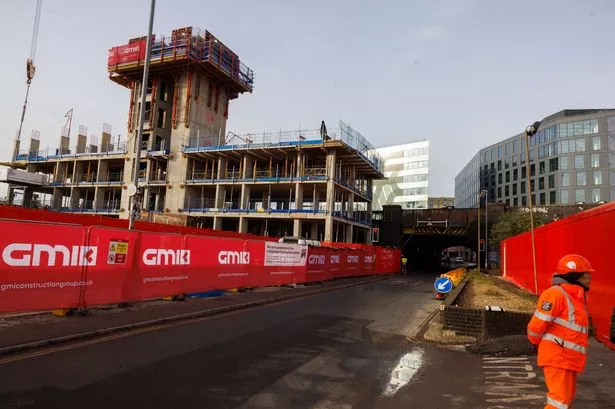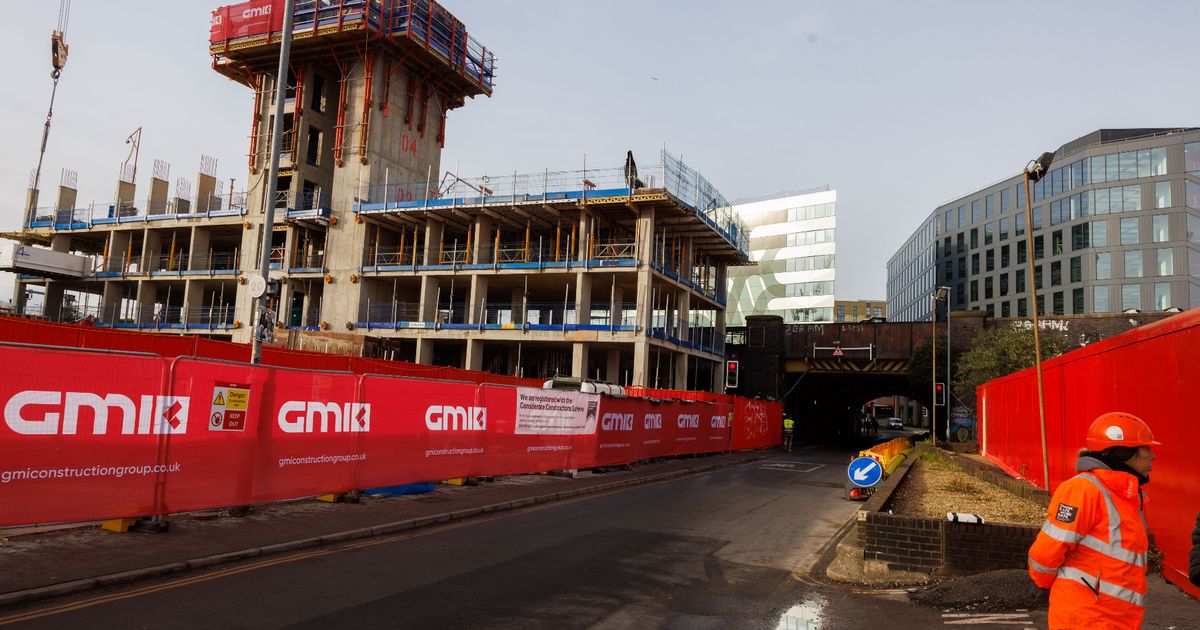It’s more expensive than LA and Hong Kong for house-building Work well underway to build new student accommodation(Image: PAUL GILLIS / Reach PLC)
Work well underway to build new student accommodation(Image: PAUL GILLIS / Reach PLC)
Bristol has become the eighth most expensive city in the world for the cost of constructing new buildings. As construction costs soar, developers and City Hall experts are warning that less affordable housing will get built over the next few years.
Building in Bristol is more expensive than Dublin, Hong Kong, Manchester, Birmingham and Los Angeles. Dutch consultants Arcadis analysed the costs of building in major cities around the world for their annual index, with Geneva topping the list, ahead of London in second place.
A new taskforce of councillors at Bristol City Council will be set up to explore how the rising costs of construction could affect how many affordable homes can be built in new developments, if at all. An update was given to the economy and skills policy committee on Monday, July 28.
Alex Hearn, director of economy of place, said: “Development often moves in cycles, which are closely aligned to wider economic conditions. Sometimes there are peaks and troughs and sometimes there are blips. We may be experiencing something that isn’t a blip and actually things have changed, because of accelerated construction cost inflation.”
The taskforce will read evidence papers and hear from staff and developers, then debate what options the council has for getting more affordable housing built despite the cost of construction. The council has policies on how many homes should be affordable in any new development, but these can be disregarded if developers say they won’t make enough profit from their project.
As well as inflation, new safety laws approved three years ago, in the wake of the Grenfell Tower fire, have made constructing tall buildings more difficult and expensive. Developers have to get approval from the Building Safety Regulator, which is suffering a major backlog that is delaying many construction projects across the country.
A shortage of skilled workers is another factor. A few days ago an investigation by Bristol Live found the boom in building high-rise housing has been hit by a “perfect storm”, with developers delaying or scrapping several major projects.
Over the past few years, the council’s planning department has been placed in special measures by the government, due to a backlog in deciding whether to grant permission for new buildings. This backlog built up after the council rolled out an employment freeze, leading to a loss of planning officers, so developers were waiting many months before starting building.
Since then the department has made progress in clearing the backlog and speeding up how quickly new planning applications are processed, with lots of new staff hired. But across the country, strict planning rules still hold up construction from taking place, with some homeowners even having to apply for permission from the council just to replace their windows.
Green Councillor Jenny Bartle said: “It’s one of the most hot topics for residents, they’re really worried about it. They’re worried about the number of developments coming through that are for students, i.e. not for them nor their families. They’re worried about everything being expensive.
“Residents in council housing are aware there’s a huge housing waiting list, to get into council housing or change your council house, and the supply of council housing is affected by this as well. It’ll be really interesting to see what solutions we can find and what the industry says to us.
“We want to make sure that we’re being transparent about those meetings. It could sound like we’re all in cahoots with the developers. It’s much more the case that we’re doing research and we want a variety of pieces of input. This is a global issue, it’s particularly acute in Bristol, but in order to overcome this, the government is going to need to help us quite substantially.”
 Bristol Live WhatsApp Breaking News and Top Stories
Bristol Live WhatsApp Breaking News and Top Stories
Join Bristol Live’s WhatsApp community for top stories and breaking news sent directly to your phone
Bristol Live is now on WhatsApp and we want you to join our community.
Through the app, we’ll send the latest breaking news, top stories, exclusives and much more straight to your phone.
To join our community you need to already have WhatsApp. All you need to do is click this link and select ‘Join Community’.
No one will be able to see who is signed up and no one can send messages except the Bristol Live team.
We also treat community members to special offers, promotions and adverts from us and our partners. If you don’t like our community, you can check out at any time you like.
To leave our community, click on the name at the top of your screen and choose ‘Exit group’.
If you’re curious, you can read our Privacy Notice.
Click here to join our WhatsApp community.
Later that day, two developers tried to reduce the amount of affordable housing they were made to build in two planned blocks of flats. Donard Homes is planning to build 221 flats near Temple Meads, on the corner of York Road and St Luke’s Road, and wants to reduce the number of affordable homes there from 66 to 25.
Goram Homes, the council-owned developer, is planning to build 166 flats on the Baltic Wharf caravan club on the Harbourside. They are still promising that 66 would be affordable, and will get a government grant to make that happen. But they now have permission to pay for only one affordable home elsewhere instead, although council staff insisted this was just a technicality.
Both Goram and Donard told the development control B committee that rising construction costs meant that they could afford to build less affordable housing. Councillors chose to get planning officers back around the negotiating table with Donard to try and get more affordable housing. These deals are known as Section 106 agreements, which are coming under increasing threat.
Speaking to the committee, Jim Cliffe, planning obligations manager, said: “At the moment and moving forward, the economic challenge of development is very high, particularly with high density development. Bristol is expensive to build in.
“The repercussions of the Building Safety Act, which is of course a very good thing, has meant that tall buildings have to have two cores in them, so two lots of stairwells and two lots of lift shafts. That means you’re selling a lot less, a much lower percentage of what you’re building.
“The role of Section 106 is probably going to diminish in the delivery of affordable housing over the next economic cycle. That’s just the reality of where we are, I’m afraid.”
